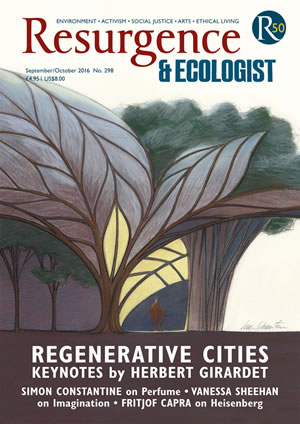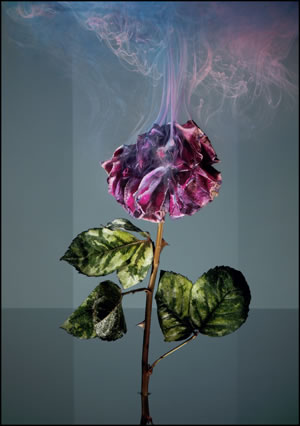I was recently in the Vienna Art History Museum. Rembrandts, Titians and Caravaggios lined the walls; paintings of such rich quality, layered with symbolism, style, skill and inspiration. As I gazed appreciatively, something struck me: all our senses are catered for by art but one – the sense of smell.
Painters delight the eye, sculptors our sense of touch. The musician crafts meaning from chords and beats, adding poetry with lyrics. Chefs create masterpieces of culinary delight, tickling the taste buds with flavour. The fashion designer moulds fabrics whose texture and form entice us. Yet somehow the perfumer doesn’t figure in this game. Why?
Clearly I am biased. As a perfumer – a predecessor of the modern word ‘perfumier’ – for over a decade now, I have often had delusions of grandeur when it came to considering perfume as art. With my father – we are self-taught – I developed the Gorilla perfume sub-brand as an aside from our day jobs at Lush Cosmetics – a company famed for its olfactory presence on Britain’s high streets. In forming Gorilla we intended to challenge the current malaise in the fragrance industry.
A hundred years ago perfumery was a vivacious and glamorous place. Fields of roses and jasmine poured their blooms into some of the great masterpieces of the time. Guerlain, Coty, Roudnitska – these were giants of creativity when it came to perfumery, responsible for some classic fragrances. Yet in recent years, somehow, this has been lost.
Sadly the modern perfumer is often little more than a chemical accountant, the creative flair nothing more than a dim flicker of the spreadsheet, whilst marketing decides what the bottle will look like. A pricing race to the bottom means that the fancy bottle you buy in an airport duty-free store is often the most expensive part of your purchase. The pale liquid inside that bottle is a mix of cheap synthetic chemicals that are Nature’s photocopies, bearing little resemblance to the original. These chemicals are useful in moderation, but the modern perfumer’s dependence on them to cut costs means that most mass-market perfumes are thin in odour and in creative expression.
Yet clearly I hope for more. I yearn for a planet full of people setting the world alight with perfume, a frenzy of fragrance exploration. Why shouldn’t odour be as rich, as colourful and as dynamic as any of our other creative worlds? The sense of smell feeds deep into our brains, the limbic system, where our mammalian forefathers left their legacy. I believe smell was our first sense, picking up chemical cues from the world around us whilst eyes and ears were still unformed. Now, however, we overlook scent’s power to connect to people.
As a perfumer I’m struck by how often a piece of work will bring tears to people’s eyes. Perfume has the unnerving ability to skip past our emotional defences and to access memories and feelings long thought buried. If you strike the right chord (or accord, in perfumery jargon), you can bring back a dearly departed loved one or a childhood moment lost in the recesses of your subconscious. It is an extremely powerful medium, more so than any other art form, I believe.
Maybe it is this that prevents us from creatively exploring scent further. Is it too real?
Or maybe it’s the fact that the longer you study perfumery, the more you realise another unnerving fact: that the sense of smell is tricking you. We may think there are good smells and bad smells, but in fact this isn’t the case. As an infant you have no preference for scent. It’s only as you reach around four years old that the concept of ‘good’ and ‘bad’ smells becomes entrenched. Not only this, but it is common practice for perfumers to put a bit of something ‘nasty’ in to make it ‘nice’. A perfumer’s organ (his workstation) is full of materials which, in concentration, smell just plain bad.
A vocabulary has developed to mask this a little, with terms such as “faecal notes” or “animalic undertones”. That’s all code for “smells like a barnyard” or “honks like a camel’s breath”. Jasmine, a notoriously carnal scent, actually contains scatole and indole, found in human faeces and rotting flesh. Even common scents like citrus can be found mimicking decidedly urine-like notes – and don’t get me started on musks. That being the case, are we just too scared to unleash the real potential of this dark art? Is it too disquieting to think that it paints a vivid picture of humanity’s contradictions?
Then again it could be the fact that if you lift the veil on the raw materials of perfumery you enter a world of great age. Precious vials of distilled essence have been used to anoint, purify, heal and seduce as far back as we can trace human civilisation. Perfume – in old Italian, parfumare was ‘to smoke through’ – isn’t a modern luxury, and the materials used to create it are just as ancient. I spend much of my time treading a modern Silk Road of aromatic wonder.
There’s rarely a place on the planet that doesn’t have some fragrant addition to make, be it the treacherous oudh, a rotting growth from the agarwood tree of Southeast Asia, or the ylang-ylang flowers of the Cananga odorata tree of the Comoros islands off the coast of East Africa. Ancient trade routes that brought frankincense, myrrh and sandalwood from the East to Europe still exist in some form, sometimes, unfortunately, involving smuggling, poaching and environmental destruction.
In fact, it seems that perfumery creation and ingredients are somehow hidden from public gaze, concealed behind the scenes of the glossy adverts and marketing campaigns of pop stars and celebrity trends. It’s a rich, complex and conceited world of materials that are arguably more diverse and thrilling than the building blocks of any other creative industry I can think of.
So what lies at the heart of the current aromatic apathy that leaves perfumery as the outsider to the art world? To be honest, I think it’s a matter of poor taste. We are uneducated. In every other sphere we have developed a sophistication as society evolves. Our tastes refine, we learn, explore, question and critique. We develop aspirations and it catches the imagination – and we need to do this for perfumery.
There is no faster way to connect emotionally with an audience, to bring Nature into someone’s home or to awaken a primal sense than with perfumery. So far, I believe, we have lacked the imagination to do with perfumery what it is capable of. Recently I have seen a small handful of perfumers out there, willing to take a step into the unknown creatively, but we need more pioneers, more excitement and more creativity and we might, one day, have the redolent revolution we so need.







